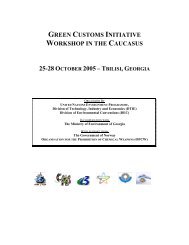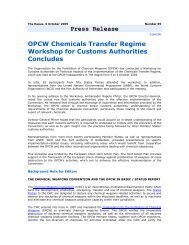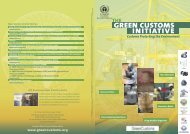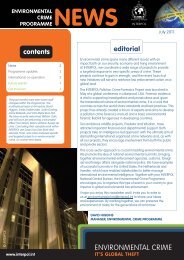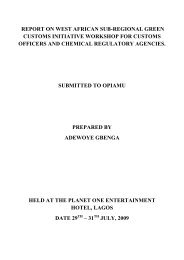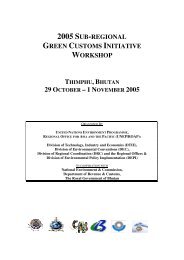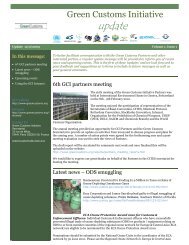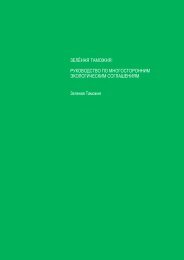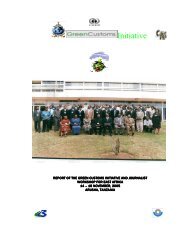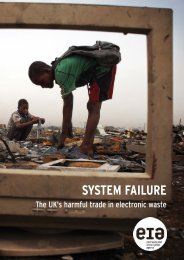Paris - Green Customs Initiative
Paris - Green Customs Initiative
Paris - Green Customs Initiative
- No tags were found...
Create successful ePaper yourself
Turn your PDF publications into a flip-book with our unique Google optimized e-Paper software.
‣ Basel ConventionMeeting Report, 27 January 2005Donata Rugarabamu gave background information and an update about past andplanned activities. Last year the Basel secretariat signed an MoU with theOrganisation for the Prohibition of Chemical Weapons (OPCW); thus the twoorganisations now collaborate at the institutional level. Ms Rugarabamu gavebackground information on the 7 th Conference of the Parties (COP), which took placein Geneva, 25-27 October 2004. For the future, the Basel Secretariat hopes todevelop long-term projects and legislation together with MEAs covering chemicalsand other partners. She also mentioned, that the Basel Secretariat hopes to conducta regional meeting in Panama, where the GCI training manual could perhaps betested.The Basel Convention has 14 regional centres to deliver training at the regionallevel.As moderator of the session, Dr. Bankobeza underlined that resources could bepooled by several MEAs to enable such regional workshops to happen.‣ Ozone SecretariatGilbert Bankobeza presented highlights of activities conducted and challenges metby the Ozone Secretariat. He noted that UNEP DTIE is the implementing arm forcustoms training in the Montreal Protocol, thus explaining the role of DTIE within the<strong>Green</strong> <strong>Customs</strong> <strong>Initiative</strong>.A major challenge for Parties to the Montreal Protocol, are the continuing activities inillegal trade in ODS which is encouraged because the prices of ODS have remainedlow compared to the cost of ODS alternatives.Furthermore he was concerned about very low reporting of cases of illegal trade bythe Parties compared to what is mentioned in the media. As per a MOP decision,Parties are requested to report such cases to the Ozone Secretariat. However, henoted that some countries such as the Unites States have undertaken impressiveefforts in catching smugglers.He also acknowledged the difficulty in achieving sustainability of customs trainingand that it is difficult to make sure, that information delivered through the training intrickling down to the whole structure.‣ InterpolMark Measer provided the presentation of Interpol’s activities and views on the<strong>Green</strong> <strong>Customs</strong> <strong>Initiative</strong>. He is one of the two individuals at Interpol responsible forenvironmental pollution and crimes. Mark Measer is in charge of pollution crimes.Up to now, Interpol offers environmental crime train-the-trainers programmes. Thesetrainings take 4 days and police officers, prosecutors and judges from differentcountries are invited to take part. The participants then go back to their home countryand teach their colleagues. The teaching back in the trainees’ home countries istaking place rather informally.For the future, one main goal in capacity building is to achieve collaboration andinformation sharing between nations. Inter alia, Interpol aims at developing a cleanseas programme with focus on combating oil pollution from vessels.‣ Rotterdam ConventionLaura Meszaros gave a quick overview about ongoing developments under theRotterdam Convention. Up to now, no training for customs officers is provided. The4



